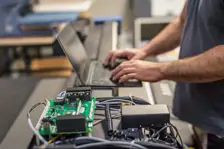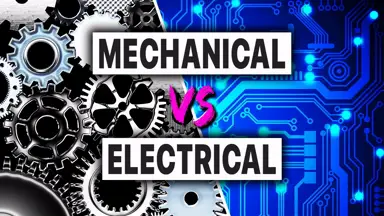Electrical & Mechanical Engineer Jobs
1. What is Electrical and Mechanical Engineering?
The manufacturing and maintenance of various electrical and electronic equipment, including engines, consumer electronics, computers, mobile phones, and other items, falls under the purview of mechanical and electrical engineering.
The fact that contemporary equipment relies heavily on electronics implies that there is a lot of overlap between these two sectors, which further complicates problems. Even yet, there are enough differences between mechanical and electrical engineering to warrant different degrees and professional pathways.
2. Who are Mechanical Engineers?
Mechanical engineer applies physics and math concepts to mechanical systems. A mechanical device was designed, tested, and maintained if it needed power to move or operate.
The domain of mechanical engineering is extensive, with professionals operating globally to develop and enhance mechanical device technologies such as:
-
Engines with internal combustion
-
Aircraft
-
Systems for conveyor belts
-
Ships
-
Wind generators
-
Refrigeration appliances
-
Automata
The field of mechanical engineering will change along with the way technology is utilized. Mechanical engineers frequently lead the way in the development of new military and civic machinery.
3. Who are Electrical Engineers?
Electrical engineering works with the design and implementation of machinery that utilizes or generates electricity, whereas mechanical engineering deals with the moving components of any machine or system.
Electrical engineers develop everything from the microchips in smartphones to the security systems in nuclear power plants, and they are essential to our civilization. Electrical engineering offers various opportunities because most people utilize many electronic devices daily. The field includes computer science, nanotechnology, telecommunications, and more.
Briefly, electrical engineers design all of these electrical systems, make sure they are installed appropriately, and then maintain them throughout time to keep them functioning properly.
4. What are the differences between Electrical Engineers and Mechanical Engineers?
Education
An electrical engineering bachelor's degree is necessary to start a career as an electrical engineer. This curriculum might take four to five years, depending on the school. During that period, students study electrical engineering, physics, mathematics, and computer science. After earning a bachelor's degree in electrical, they may specialize even further with a master's degree, which also makes them eligible for senior roles in engineering companies.
A bachelor's degree in mechanical engineering is necessary to be eligible for positions in the field. With courses in robotics, algebra, electromagnetic, mechanical design, and engineering computations, the curriculum provides them with an introduction to the fundamentals of engineering. A master's degree following a bachelor's degree might be of interest to anyone looking for management or executive roles in the mechanical engineering sector.
Prerequisites for careers
An interest in innovation and technology is necessary for the discipline of electrical engineering. Electrical engineering calls for more manual labor but also more theoretical understanding. The gathering and analysis of data, sophisticated arithmetic, cooperation, communication, and the design and upkeep of electrical systems are a few examples of the abilities and competencies needed to succeed as an electrical engineer.
A solid foundation in mathematics and physical science is necessary for mechanical engineering. This discipline of engineering may place a high importance on machinery and technology since its members spend a lot of time creating and maintaining mechanical structures. Thermodynamics, physics, hydraulics, pneumatics, problem-solving, conflict resolution, and cooperation are among the abilities and expertise mechanical engineers may need.
Responsibilities
Electrical systems and gadgets are designed, constructed, and tested by electrical engineers. To ascertain the needs and technological gadgets that are in demand, they test prototypes, develop software, and keep an eye on market trends. As part of their everyday job, they must also come up with novel techniques to control currents and voltages to design new, user-friendly systems. These engineers could work on navigation systems, cars, airplanes, and electric motors.
Mechanical engineers develop, construct, and test mechanical equipment, including heat sensors, as part of their everyday work. They supervise the production of diverse gadgets, construct and evaluate prototypes, identify machine problems by overshooting, and make necessary adjustments. A mechanical engineer may work on automobile engines, elevators, escalators, generators, and turbines, among other constructions. To carry out intricate mathematical studies, these engineers could also employ computer programs.

5. What are the important skills for Mechanical engineers?
Core Engineering and Technical Knowledge:
The cornerstone of an electrical and mechanical engineer's skill set is a solid understanding of fundamental engineering concepts. A thorough grasp of fluid dynamics, thermodynamics, materials science, and mechanics is required for this. It is also crucial to be proficient with various technical tools like computer-aided design (CAD) and manufacturing (CAM) software. In this constantly changing area of engineering, staying current with the newest technology and processes is essential to success.
Creative Problem-Solving and Design
Creative problem-solving and inventive design are essential for electrical and mechanical engineers. This calls for the capacity to envision, design, and build mechanical systems and products from the ground up. Engineers need to be skilled in recognizing, evaluating, and resolving complex issues, which frequently call for creative solutions that are economical, efficient, and sustainable.
Organization and Project Management
Since mechanical engineers frequently oversee projects from inception to conclusion, project management expertise is essential. Planning, scheduling, budgeting, and supervising different project components while controlling resources and deadlines are necessary for this. Good organizing abilities contribute to projects being finished on schedule, within budget, and in scope.
Teamwork and Interpersonal Skills
In tasks involving mechanical engineering, teamwork is essential. Engineers need to collaborate well with technicians, non-technical employees, and other engineers in cross-functional teams. Communication, negotiation, and dispute resolution are examples of interpersonal skills that are crucial for promoting cooperation, effectively communicating difficult technical knowledge, and sustaining fruitful working relationships.
6. What are the important technical skills for an Electrical Engineer?
Circuits: Since circuits are a basic building block of electrical systems, understanding circuits is crucial for those pursuing careers in electrical engineering. You have to be aware of how to construct them and how they operate.
Calculus: You have to be somewhat knowledgeable about different calculus and mathematical formulae. These will come in handy for product development calculations.
Design for electricity: You will plan, create, and test items using your electrical design skills throughout the development process. By doing this, you can be sure they function up to par.
Coding: Electrical engineers can benefit from having a basic understanding of computer programming as it makes data analysis and database management easier. C, C++, and Java are a few of the languages that electrical engineers frequently use.
Troubleshooting: is a critical skill that electrical engineers require to solve problems effectively. Troubleshooting calls for a combination of problem-solving skills and tool-use expertise to provide solutions.







